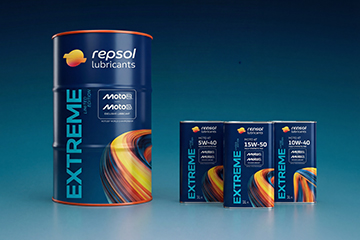mPAO synthetic lubricant for mining traction engines

Repsol Lubricants has developed a synthetic lubricant candidate formula based on mPAO (metallocene polyalphaolefins) specifically developed for mining traction engines. The solution, conceived at the Móstoles TechLab and aligned with the main international standards and manufacturers' requirements, enters its validation phase with a view to field tests in mining fleets.
"We have a product that’s ready for field testing that will lead us to a successful process," said Ibán Báscones, product manager of industrial lubricants at Repsol Lubricants, at PERUMIN, the most important mining convention in Latin America.
The technical challenge of mining traction engines
Traction engines on trucks and mining equipment operate under extreme conditions: high loads, dusty environments, frequent start-stop cycles, and steep thermal gradients. In this context, industrial lubricant for mining not only has to reduce friction but also cools, protects internal components, and contributes to the overall efficiency.
"Traction engines in the mining sector are equipment subject to strong technical requirements, which is why synthetic oils play a fundamental role," explains Báscones. Key advantages over traditional mineral technologies include, longer change periods, greater compatibility with materials, better care of internal gears ,and less friction.
mPAO: the foundation that facilitates the hybridization and electrification of the mining sector
Metallocene PAOs (mPAOs) are synthetic polyalphaolefins that are manufactured using metallocene catalysts made from the polymerization of monomers such as ethylene, in addition to hydrogenation and refinement. In this way, they provide a more uniform molecular structure and better lubrication than conventional PAO. This translates to a very high viscosity index, excellent thermal and shearing stability, better low temperature flow, increased durability, and broad compatibility with metals and seals.
"Metallocene mPAO bases will play an important role in the hybridization and electrification of the mining sector, given their high performance and as a fundamental part in the lubrication of these traction engines," Báscones emphasizes. In addition, by extending the lubricant’s useful life, waste oil residues are reduced, reinforcing the sustainability of operations.
From the TechLab to the site: rigor, standards, and OEM requirements
The development of the new mPAO lubricant has been carried out at Repsol's TechLab in Móstoles (Madrid), where more than 200 professionals carry out tests and checks aligned with international regulations and the requirements of equipment manufacturers. "In this way, we make sure that the products, once we go to the field test phase, will meet all these requirements," said Báscones.
Prior to field deployment, the candidate formula has been rigorously tested against GE D50E35 specifications for traction engines as well as Wabtec and Komatsu requirements. The check includes lab performance tests and a monitoring plan that involves sampling and periodic analysis of the oil to monitor viscosity and particles, among other aspects.
With the candidate formula development stage completed, Repsol Lubricants is moving towards field testing in traction engines. This pilot, carried out in collaboration with mining operations and manufacturers, will allow to confirm in real conditions the benefits of mPAO technology and complete the approval process with the different agencies and manufacturers.
The importance of choosing the right industrial lubricant
The correct selection of lubricant in mining has a direct impact on the availability of equipment, the total cost of operation, and the safety of the process. That way, a lower coefficient of friction reduces energy consumption and operating temperature, while greater oxidation and shearing stability sustains protection under varying loads; and extended change intervals reduce shutdowns and waste oil residues.
"The correct selection of lubricants and greases in the mining sector is essential to avoid breakdowns. In addition, monitoring the oil in service is very important, as it allows us to see the lubricant’s useful life and even predict potential breakdowns, "concludes Báscones.
If you are considering different lubrication solutions for mining installations, the Repsol Lubricants technical team can help you in the selection, the in-service monitoring plan, and the preparation of field tests. Simply fill out this form and we will be happy to offer you the advice you need.
Related content




